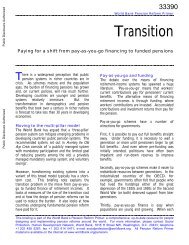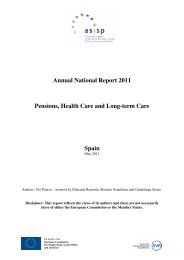Financial Sector Development in Africa: Opportunities ... - World Bank
Financial Sector Development in Africa: Opportunities ... - World Bank
Financial Sector Development in Africa: Opportunities ... - World Bank
Create successful ePaper yourself
Turn your PDF publications into a flip-book with our unique Google optimized e-Paper software.
The Potential of Pro-Market Activism for F<strong>in</strong>ance <strong>in</strong> <strong>Africa</strong>: A Political Economy Perspective 181<br />
This chapter makes three ma<strong>in</strong> arguments.<br />
• First, it argues that although the current view on the role of government<br />
<strong>in</strong> the promotion of access to f<strong>in</strong>ance offers a realistic way forward<br />
toward mak<strong>in</strong>g f<strong>in</strong>ance work for <strong>Africa</strong>, the associated policy implications<br />
rema<strong>in</strong> unclear. This is because of the lack of a fully developed<br />
positive approach to government activism that provides a framework<br />
help<strong>in</strong>g to evaluate ex ante whether a government has the political will<br />
and capacity for efficiently play<strong>in</strong>g an activist role. This chapter seeks<br />
to contribute toward develop<strong>in</strong>g such a framework, because it would<br />
help development practitioners assess whether activist government<br />
<strong>in</strong>terventions have a chance to succeed <strong>in</strong> a particular country.<br />
• The second argument is that political economy could provide the theoretical<br />
foundation for such a framework, because political economy<br />
allows for the model<strong>in</strong>g of policy choices as the outcome of a barga<strong>in</strong><strong>in</strong>g<br />
process between <strong>in</strong>terest groups that cut across state and society.<br />
• The third argument is that a political economy framework would not<br />
only help <strong>in</strong> evaluat<strong>in</strong>g the chances of efficient government <strong>in</strong>terventions<br />
but could also <strong>in</strong>form policy mak<strong>in</strong>g <strong>in</strong> countries that currently<br />
lack the conditions to govern f<strong>in</strong>ance through activist policies.<br />
These arguments build upon two strands of literature: the welfare economics<br />
argument <strong>in</strong> favor of government <strong>in</strong>terventions to address market<br />
failures and an <strong>in</strong>terest group model of political economy focus<strong>in</strong>g on the<br />
role of state–private sector relationships. Empirically the arguments are<br />
based on experiences with activism <strong>in</strong> the develop<strong>in</strong>g world both with<strong>in</strong><br />
and outside of <strong>Africa</strong>. Thus, the chapter focuses on the role of government<br />
<strong>in</strong> bank<strong>in</strong>g and not <strong>in</strong> the securities market, because banks still account<br />
for the vast majority of f<strong>in</strong>ancial sector assets <strong>in</strong> poor countries (exclud<strong>in</strong>g<br />
central bank assets) (Demirgüç-Kunt, Beck, and Honohan 2008, 10).<br />
The chapter is organized as follows: the next section exam<strong>in</strong>es <strong>in</strong> more<br />
detail the current consensus on the potential of activist government <strong>in</strong>terventions<br />
to <strong>in</strong>crease access to f<strong>in</strong>ance for private productive <strong>in</strong>vestment.<br />
It beg<strong>in</strong>s by present<strong>in</strong>g the welfare economics argument <strong>in</strong> favor of activism<br />
and proceeds with an overview of develop<strong>in</strong>g-countries’ experience<br />
with activism and of the new, more political perspective on government<br />
activism. The follow<strong>in</strong>g section discusses the problems that development<br />
practitioners currently face when it comes to prioritiz<strong>in</strong>g reforms without







